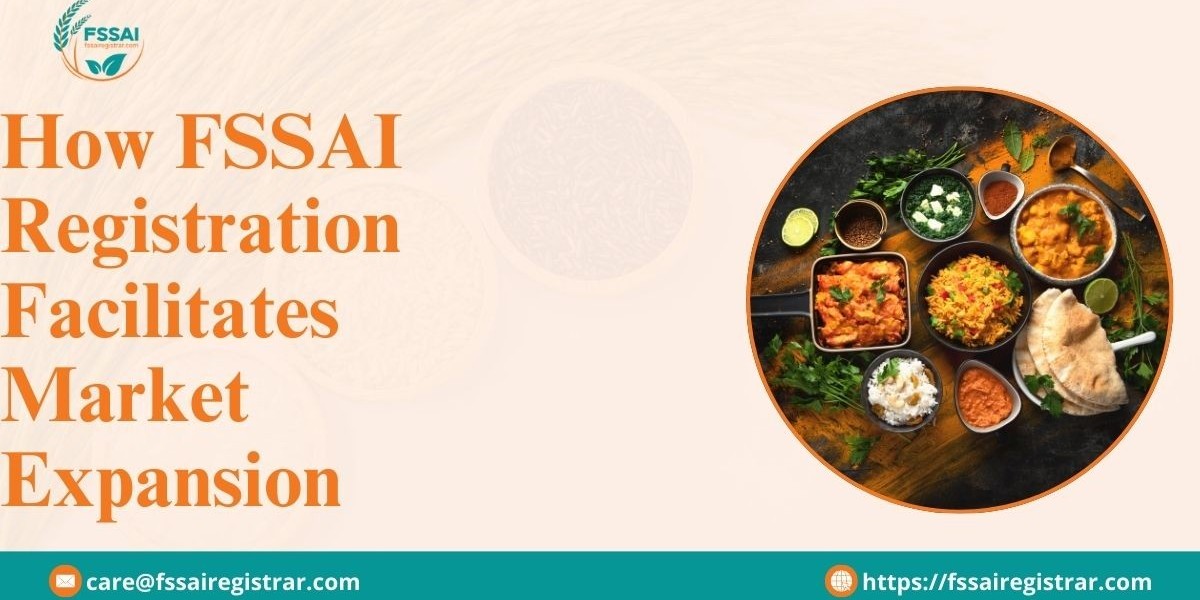In the modern landscape of the food industry, ensuring food safety and compliance is not just a legal obligation but a strategic advantage. The Food Safety and Standards Authority of India (FSSAI) plays a pivotal role in maintaining food safety standards and ensuring consumer trust. Beyond its regulatory function, FSSAI registration offers significant growth opportunities to businesses, particularly when it comes to market expansion. From small-scale startups to large food manufacturers, the impact of FSSAI registration on market credibility, consumer reach, and overall business scalability is profound.
Understanding FSSAI Registration
FSSAI registration is a mandatory compliance for all food businesses operating in India. It involves obtaining a 14-digit license or registration number that must be printed on all food packages. This process ensures that the food products being manufactured, processed, or distributed meet the standards set by the FSSAI.
There are three types of FSSAI licenses:
- Basic Registration – For small businesses with an annual turnover of up to ₹12 lakh.
- State License – For businesses with turnover between ₹12 lakh and ₹20 crore.
- Central License – For large-scale enterprises with turnover above ₹20 crore or operations across multiple states.
While the primary goal of this registration is to regulate food quality and safety, its influence stretches far beyond compliance. FSSAI registration can be a catalyst for business growth and an enabler of new market opportunities.
The process to apply for FSSAI Registration
- Visit Website – Open the official FSSAI registration portal.
- Fill Application Form – Enter your name, business details, and food category, and upload your PAN card.
- Review & Submit – Check all details and submit the form.
- Pay Fee – Complete the payment online as per your license type.
- Verify OTP – Enter the OTP sent to your registered mobile or email.
- Inspection (If Required) – Officials may inspect your premises for approval.
- Get an FSSAI License – Once approved, download your FSSAI license from the website.
1. Builds Consumer Trust and Brand Credibility
Today’s consumers are well-informed and selective about the food products they consume. They often examine food labels for quality assurance and safety certifications. Displaying the FSSAI logo on the packaging signals that the product complies with India’s highest food safety standards.
This builds trust among customers and enhances brand credibility. A business with an FSSAI license is seen as more reliable and professional, creating a positive perception that can boost customer loyalty and sales. As trust grows, the brand becomes more attractive not only to consumers but also to retailers and distributors, expanding access to wider markets.
2. Enables Entry into Organized Retail Chains
Supermarket chains and online food delivery platforms demand FSSAI compliance before stocking or listing products. Without an FSSAI license, small manufacturers and producers are barred from entering these high-volume sales channels.
For businesses looking to scale, getting into these platforms is essential. FSSAI registration serves as a passport to enter:
- Supermarkets and hypermarkets
- E-commerce platforms like Amazon, BigBasket, and Flipkart
- Online food delivery platforms like Zomato and Swiggy
This registration allows food businesses to transition from informal or local markets into structured, nationwide retail ecosystems, thereby expanding their geographical reach.
3. Strengthens Export Opportunities
FSSAI registration is not only recognized within India but also carries weight internationally. When applying for export licenses or international quality certifications (like HACCP, ISO 22000, etc.), having an FSSAI license is often a prerequisite.
International buyers and importers are cautious when sourcing food products from overseas markets. FSSAI registration offers credibility and assurance of safety, thereby increasing the likelihood of forming international partnerships. It opens doors to global markets, allowing Indian food exporters to expand their footprint in the Middle East, Europe, the U.S., and beyond.
4. Facilitates Business Loans and Financial Support
When applying for loans or funding from banks and financial institutions, documentation plays a crucial role. An FSSAI registration certificate is often required when applying for:
- Business loans
- Working capital loans
- MSME subsidies or schemes
The registration proves the legal existence and operational status of the food business. Lenders view FSSAI-registered businesses as legitimate and lower-risk, which may lead to quicker approvals and better financial terms.
Access to finance allows businesses to expand production capacity, invest in supply chain logistics, and scale operations—all of which are essential for capturing new market segments.
5. Encourages Product Innovation and Line Expansion
FSSAI compliance ensures that food safety is embedded in every stage of product development. With this foundation, businesses are encouraged to explore new product categories, diversify their offerings, and enter emerging sectors such as:
- Organic foods
- Functional foods and nutraceuticals
- Packaged snacks and ready-to-eat meals
- Health and wellness foods
With every new product, businesses can tap into new demographics, regions, and consumer trends. Since these products are already under the umbrella of FSSAI compliance, the process of launching them becomes faster and easier, fueling growth and market exploration.
6. Boosts Digital Visibility and Online Reach
FSSAI registration is also instrumental in establishing an online presence. E-commerce platforms, whether for grocery delivery or specialty foods, require FSSAI numbers for all food listings. For example:
- Home-based bakers selling through Instagram
- Cloud kitchens operating on delivery apps
- Packaged food brands selling on their websites
FSSAI compliance ensures businesses are eligible to advertise, promote, and sell digitally, vastly expanding their market beyond local confines to a national or even global audience.
7. Mitigates Legal and Operational Risks
Operating without an FSSAI license exposes businesses to legal action, penalties, and shutdowns. This not only affects reputation but also disrupts operations, halting growth opportunities.
With proper registration:
- Businesses remain protected from regulatory action
- Smooth inspections and renewals ensure continuous operation
- There’s confidence in scaling operations without fear of closure
When the risk of non-compliance is eliminated, food businesses can focus their energy on expansion strategies and innovation without worrying about bureaucratic roadblocks.
8. Improves Brand Positioning in Competitive Markets
In sectors where brand differentiation is difficult—like packaged snacks, beverages, or condiments—FSSAI registration can serve as a USP (Unique Selling Proposition). It demonstrates professionalism and commitment to safety and quality.
A certified food business can:
- Highlight its FSSAI credentials in marketing campaigns
- Emphasize hygiene and compliance in branding
- Position itself as a premium or trusted brand
This competitive edge becomes especially important in crowded urban markets or when competing against well-established brands.
9. Supports Participation in Government Schemes
Many government schemes such as PMFME (Pradhan Mantri Formalization of Micro food Processing Enterprises) or MSME schemes for food businesses require FSSAI registration as a basic eligibility criterion.
With an FSSAI license in place, businesses can access:
- Subsidies
- Skill development programs
- Infrastructure support
- Cluster development opportunities
These schemes are designed to help food businesses scale efficiently and expand into underserved markets, particularly in rural and semi-urban areas.
10. Enhances Investor Confidence
For startups and growing food businesses looking for external investment, FSSAI registration is a must-have compliance. Investors are risk-averse and seek ventures that operate within the legal framework and have a clear growth potential.
A registered FSSAI license signals that the business:
- Has market legitimacy
- Is eligible for formal sales channels
- Can scale within regulatory guidelines
This increases investor confidence, unlocking funding for product development, regional expansion, or marketing—all of which contribute to larger market capture.
Suggested read:- Renewing and upgrading your FSSAI License
Conclusion
FSSAI registration is far more than a legal formality—it's a strategic asset for any food business aiming for long-term growth and market expansion. From establishing brand credibility to enabling access to organized retail, exports, and digital marketplaces, this simple yet powerful compliance measure opens the doors to numerous opportunities.
Whether you're a small food startup, a local manufacturer, or a large-scale exporter, FSSAI registration lays the foundation for sustainable and scalable success. By ensuring compliance, boosting trust, and providing market access, it acts as a springboard for transforming a local food business into a national or even global brand.


